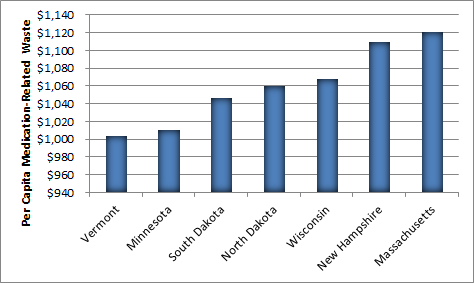There's always a flip side to any coin. I recently wrote about seven states that pharmacy benefits manager Express Scripts (NASDAQ: ESRX ) identified as the most wasteful when it comes to medication-related spending. Since that article focused on the negative side, it's only fitting that I also highlight the states that are doing the best on this front.
Express Scripts looked at several areas in identifying potential waste. One involved cases where patients purchased higher-cost medications when lower-cost alternatives were available. Another focused on times when patients could have gone with a lower-cost pharmacy, such as a specialty pharmacy or home delivery. The last category of waste related to patients not adhering to medication treatments.
Around $418 billion was wasted in 2012 in these ways, according to Express Scripts' research. While all states were guilty of wasteful spending, some performed much better than others. Here are the seven states wasting the least amount per capita on medication spending.

Source: Express Scripts
Birds of a feather
A quick look at the map reveals that these seven states cluster in one of two areas. Vermont, New Hampshire, and Massachusetts are all neighbors in the Northeast U.S., while Minnesota, South Dakota, North Dakota, and Wisconsin form a block in the North Central U.S.
This geographic proximity for the two groups is interesting, because a similar phenomena was seen with the seven most wasteful states -- all of which were located in the South. However, as with the most wasteful states, my hunch is that other commonalities provide a better explanation for why these states are among the least wasteful.
One common denominator among six of the seven states relates to education attainment. All but Massachusetts ranked in the top 15 states with the highest percentage of residents graduating from high school or receiving additional education. Massachusetts came in 19th among all states in this category.

Source: U.S. Census Bureau.
I don't think that higher high school graduation rates per se make a state less likely to be wasteful. However, increased education attainment could correspond with increased awareness of ways to control costs most effectively.
An even stronger common theme is health status. All seven of the states wasting the least on medications ranked in the top 15 states with the most residents reporting good health.

Source: Centers for Disease Control and Prevention.
The logic behind why health status ties to medication spending wastefulness is straightforward. Better health should correlate with lower volume of prescription drugs taken. Less money spent on prescription drugs presents fewer opportunities for wasteful spending.
There could be other common denominators among these seven states that partially explain why medication spending is less wasteful than elsewhere. However, I don't think that the patterns of the states ranking at the bottom on wasteful medication spending and near the top for education attainment and health status are coincidental.
Lucky seven?
Can the information behind these seven least wasteful states lead investors to ideas for finding luck in the stock market? I think so.
While these states fare better in the analysis, every one of them still shows more than $1,000 per capita in annual wasteful spending on medications. Combined with the other 43 states, the amount wasted by Americans by poor medication spending decisions totals $418 billion. That reflects a big pool of potential savings for companies that specialize in holding down those costs.
Pharmacy benefits managers, or PBMs, specialize in this very thing. Leading PBMs include Express Scripts, CVS Caremark, UnitedHealth Group's (NYSE: UNH ) OptumRx subsidiary, Catamaran (NASDAQ: CTRX ) , and DST Systems' Argus Health Systems. Several of these stocks have performed very well over the last three years.

CTRX data by YCharts.
These aren't exactly apples-to-apples comparisons, though. Express Scripts and Catamaran focus primarily on PBM services, but the others do not. CVS Caremark operates one of the largest retail pharmacy chains in the U.S. UnitedHealth Group is the largest managed care company in the nation. DST Systems provides financial and customer communications services.
For investors hoping to capitalize on the opportunities in controlling wasteful medication spending, Express Scripts and Catamaran present the most focused options. Express Scripts brings scale and in-depth analysis capabilities as the largest PBM in the country. Catamaran ranks as the fourth-largest PBM and appears to have even more room to grow than its larger counterpart. However, its stock is also the pricier of the two, with a forward price-to-earnings multiple of 22 compared to Express Scripts' forward P/E of 12.
Both Express Scripts and Catamaran should be solid picks over the long run. I like the prospects for the PBM industry over the coming years. These investment opportunities shouldn't be wasted.
Do lower costs = profits for your portfolio?
In 2011, a massive shift began. With the first of the baby-boomer generation reaching Medicare age, America's health care landscape was forever changed. Combine the aging population with the impact of Obamacare, and the need for innovative solutions for skyrocketing health care costs is as clear as ever. Express Scripts is part of that solution, and in this brand new premium report on the company, we clearly lay out the opportunity in front of this misunderstood stock. Claim your copy by clicking here now.
No comments:
Post a Comment